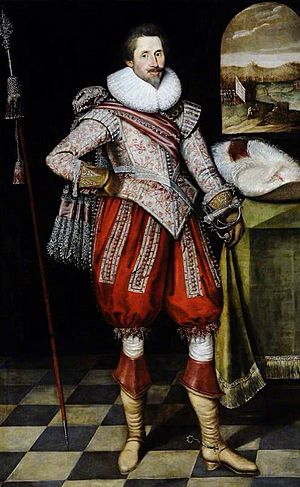Henry Cary, 1st Viscount Falkland facts for kids
Henry Cary, 1st Viscount Falkland (born around 1575, died September 1633), was an important English politician and landowner. He served in the English Parliament from 1601 to 1622. In 1620, he was given the special title of Viscount Falkland in Scotland. From 1622 to 1629, he held a very important job as the King's main representative in Ireland, known as the Lord Deputy of Ireland.
Contents
Henry Cary's Early Life and Education
Henry Cary was the son of Sir Edward Cary, who managed the King's jewels. Henry went to Exeter College, Oxford when he was about 16 years old. He was a very good student and learned a lot. After his studies, he served as a soldier in France and the Netherlands. During this time, he was even captured by enemy forces.
Life at Court and Political Career
When Henry Cary returned to England, he joined the royal court. He became a "Gentleman of the Bedchamber," which meant he was a close attendant to the King. In 1599, he was made a knight.
Serving in Parliament
In 1601, Henry Cary was elected to the House of Commons, which is part of the English Parliament. He represented the area of Hertfordshire. He also worked as a Justice of the Peace, helping to keep law and order.
In 1603, he started sharing his father's job as the "Master of the Jewels." He was re-elected to Parliament in 1604 and again in 1621. Even though he received a Scottish title later, it didn't stop him from serving in the English Parliament.
Royal Entertainments
Henry Cary was also involved in court entertainment. He danced in a special play called Hymenaei at a royal wedding in 1606. He also performed in another play at Caversham Park in 1613 for Anne of Denmark, the Queen.
Becoming a Viscount
In 1616, Henry Cary was made a Knight of the Bath, a special honor. The next year, he became the "Comptroller of the Household" and a "Privy Councillor." This meant he helped manage the royal household and advised the King. When his father died in 1618, Henry inherited the family lands.
In 1620, King James I gave him the title of Viscount Falkland in Scotland. This was a very important step up in his career.
Lord Deputy of Ireland
In 1622, Henry Cary was chosen to be the Lord Deputy of Ireland. This was a very challenging role, as he was the King's main representative and had to govern the country. He started his job on September 18, 1622.
Challenges in Ireland
Falkland faced many difficulties in Ireland. He was concerned about the number of Catholic priests and their influence. In 1623, he ordered them to leave the country. However, this order was soon softened by the English government due to ongoing political talks.
He also had to find ways to pay for the English army in Ireland. In 1626, he met with Irish nobles to discuss this. They talked about a set of agreements called the "Graces," which offered some religious freedoms and land rights. After long discussions, the nobles agreed in 1628 to provide money for the army.
Falkland also tried to investigate a supposed conspiracy in Wicklow, hoping to take over lands there. However, his investigations were later found to be based on false information. Because of these difficulties, King Charles I asked him to step down from his role in 1629. Even so, the King still thought highly of him.
Later Life and Interests
Henry Cary continued to enjoy literature throughout his life. He wrote an epitaph (a short poem for a tombstone) for a countess. A book called 'The History of the most unfortunate Prince, King Edward II' was found among his papers and published after his death.
Sadly, Henry Cary broke his leg at Theobalds Park. The injury was so severe that his leg had to be removed. He died in September 1633 and was buried in Aldenham.
Family Life
In 1602, Henry Cary married Elizabeth Tanfield. She was 16 or 17 years old and very intelligent. Elizabeth was known for her love of learning and could speak many languages, including French, Spanish, Italian, Latin, and Hebrew.
Elizabeth later converted to Roman Catholicism. This caused some disagreements with her husband, and she left Dublin in 1625. The King's council allowed her to live separately and gave her money for support. After Henry returned to England, they became friends again, but still lived apart.
Elizabeth was also a talented writer. She translated a French cardinal's works and wrote poems about saints and hymns. The famous poet John Marston dedicated his collected works to her in 1633. She died in October 1639.
Henry and Elizabeth had 11 children. Here are some of them:
- Lucius, who became the 2nd Viscount Falkland after his father.
- Lawrence, who became a knight and died fighting in Ireland in 1642.
- Patrick, who wrote poems.
- Placid (Henry), who became a Catholic priest.
- Four daughters—Anne, Lucy, Elizabeth, and Mary—became nuns in a convent in France.
- Another daughter, Victoria, married Sir William Uvedale.
See also
 | Jewel Prestage |
 | Ella Baker |
 | Fannie Lou Hamer |


